#ecocriticism
Text

the twelve winds
illustration from an astrological-astronomical miscellany, alemmanic german, c. 1500
source: Wolfenbüttel, HAB, Cod. Guelf. 8.7 Aug. 4º, fol. 124r
156 notes
·
View notes
Text
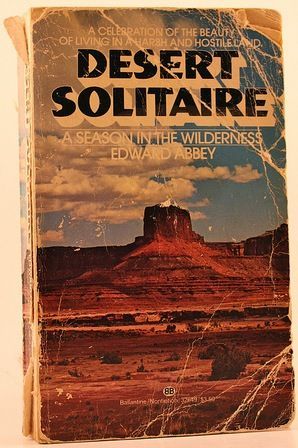
I've been reading Edward Abbey's Desert Solitaire as research for a project of mine, and it has certainly been an experience.
Desert Solitaire was one of these titles I'd heard bandied about in American nature literature growing up (the kind of thing teachers recommended once you finished Hatchet), but I don't here his work mentioned as much anymore. I recently re-encountered the title on a literal ecofascist reading list. While Abbey doesn't sound like an ecofascist himself, I can easily see why nature Nazis like him.
The book chronicles Abbey's time as a seasonal park ranger at the Arches National Monument in Utah There is a kind of uncertainty and inconsistency in the way he writes, even in the way he acts towards his surroundings in the desert. Silent Spring had only been published a few years before Solitaire was, and the eco-cultural revolution was not yet in full swing. Abbey writes lovingly about his desert environment. He describes in stunning detail, for example, the everyday beauty of a bumblebee alighting on a cactus flower, and decries the reckless "development" initiatives of the Bureau of Public Roads. But on the next page, he will say something like this:
"...it's a foolish, simple-minded rationalism which denies any form of emotion to all animals but man and his dog. This is no more justified than the Moslems are in denying souls to women."
Sure dude.
Okay, fine, he was writing in the sixties. Some insensitivity is par for the course. But then, after pages and pages of decrying humans driving desert flora and fauna towards extinction, he describes with glee an instance where he stones a rabbit to death for no apparent reason.
It's a bizarre passage, and shows Abbey at his most unhinged. He describes the rabbit as "cowardly" for running away from threats, unlike the brave mountain lion, who stands and fights. He throws the stone and hits the rabbit's head:
"He crumples, there's the usual gushing of blood, etc.," and the creature is dead.
"I continue my walk with a new, augmented cheerfulness which is hard to understand but unmistakable [...] I try but cannot feel any sense of guilt."
Reflecting on the incident, he concludes that his killing of the rabbit has made him a part of the desert, a membership bought by killing or being killed, being "predator or prey". Even so, he decides not to eat the rabbit, which he says is probably diseased anyway.
He also describes using his walking stick to crush and stir up an ant colony, also without any reason beyond not liking ants.
"Don't actually care for ants. Neurotic little pismires."
These are far from the only times that Abbey violates his personal philosophy of reverence for all living creatures.
It's clear that Edward Abbey came to Arches National Monument already dissatisfied with the outside world, and with some authority issues to boot (some quick googling on his background shows two demotions as a military police officer for clashing with higher-ups). The freedom of the desert, its simplicity and balance, is a significant part of what makes it appeal to him. But its harshness, the hostility of its sandstorms and lurking rattlesnakes, draws him in just as much.
Edward Abbey is not an ecofascist. If anything, his ill-defined political beliefs can be vaguely defined as anarchistic, if they can be defined at all. Deleuze and Guattari write in A Thousand Plateaus that fascism is "a cancerous body rather than a totalitarian organism". It is fluid, mutable. Sometimes it lies latent, benign; at other times it rushes outward, colonizing piecemeal and erratically, in "flows capable of suffusing every kind of cell". Elements of Abbey, and of Desert Solitaire, contain such microfascisms.
Let's turn back to the linchpin of it all: the killing of the rabbit, which he sees as a joyous, cosmic act; one that links him into a (circular? pyramidal?) chain of being he was previously alienated from, in the atomized world of civilization. His joy is only augmented when he realizes he is not guilty for killing the rabbit. In per-modern hunting customs across the world, the taking of animal life is never free and unmediated. Thanks may be given to the spirit of the animal itself, or to the unseen powers that led the hunter to their quarry. Naturally, the sacrifice of an animal to a god was just that: for a god, not the human involved. What Abbey describes in the killing of the rabbit is something utterly different.
In Federico Finchelstein's Fascist Mythologies, Finchelstein says that in fascism,
"consciousness was not a repression of inwardness (as Freud understood the workings of the Ego and the Id) but its actual distillation. [...] [Fascist consciousness] was not contemplative but similar to that of a sublime sensation of ecstasy."
The fascist subject is most "conscious" precisely when they loose themselves in the ecstatic abandon of the act. Such fascist consciousness is the foundation of the free, easy violence it facilitates.
When Abbey describes casting the stone at the rabbit, it is in a Meursault-like twilight of awareness. He sets up the encounter as a game, one in which he is a scientist experimenting on a rabbit that has been "volunteered" to him, and whose death is justifiable through its natural cowardice. He hardly realizes that the action he is carrying out, and when the rabbit dies he is shocked out of his reverie for a moment.
"For a moment I am shocked by my deed [...] but shock is succeeded by a mild elation."
For Abbey, primordial violence is what at last allows him union with the sacred world of the desert.
"No longer do I feel so isolated from the sparse and furtive life around me, a stranger from another world. I have entered into this one. We are kindred all of us [...] Long live diversity, long live the Earth!"
By carrying out this act of bare violence, Abbey frees himself from the civilized world and achieves union with the world of Nature, in which violence is a simple act: one that creates its own order rather than supporting existing ones. It is this union that, while the moment lasts, allows him to rejoice in his newfound "innocence and power".
That is where I will leave things for now. There are other, more overt themes that Abbey explores that are the chief reason Desert Solitaire appeals to many ecofascists, such as its characterizations of industrial society and "Progress". Abbey's later work, such as The Monkey Wrench Gang, set even more explicit examples of direct action and sabotage that inspired right-wing accelerationists as well as left-wing environmental activists. This is my first long-ish post; if you're interested in these kinds of posts on ecofascism and ecocriticism, let me know and I might make more in the future.

287 notes
·
View notes
Text


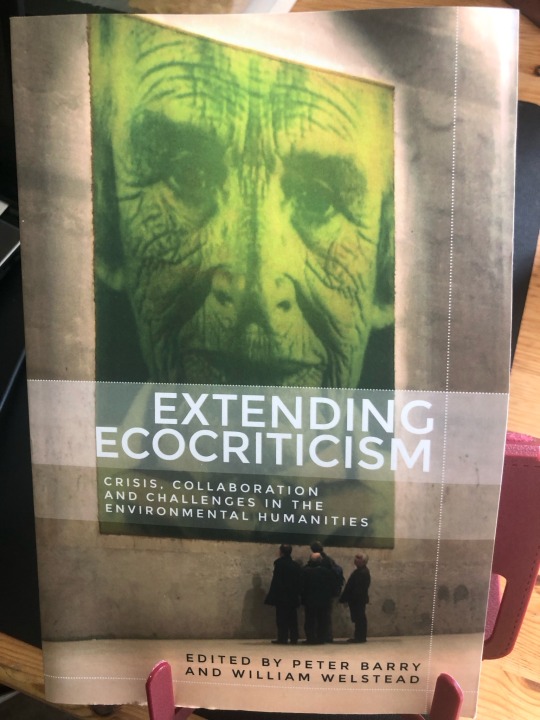
Happy Solarpunk Aesthetic Week everyone 🌻
#solarpunk#solarpunk aesthetic week#butterfly#wildlife photography#weaving#crafts#ecocriticism#environmentalism#hopepunk#social justice#bright future#climate justice#optimism
119 notes
·
View notes
Text
Insides (2024)
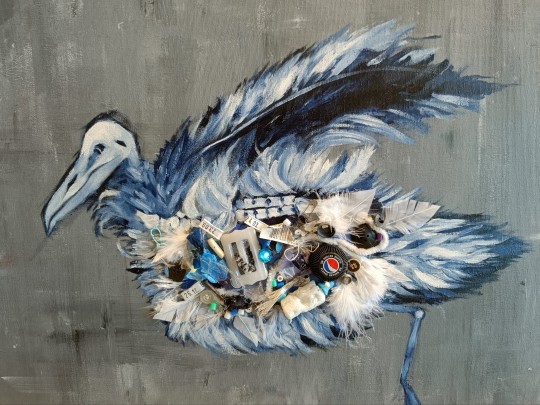


Oil, acrylics and found objects
A series of 3 ecocritical paintings inspired by pictures of birds taken by Chris Jordan

This is a big project I've been working on for the past 4 months in my Visual Arts class!! If you live in Finland (specifically near Helsinki) you are welcome to go and see these paintings (and some more artworks) displayed on the windows of the Ministry of Environment :3
#IB visual arts#ib program#oil painting#original art#traditional art#original painting#ecocriticism#my art#art#painting#Big thanks to my teacher and my girlfriend for giving me helpful advice and encouragement (。・ω・。)ノ♡
9 notes
·
View notes
Text
emily wilson comparing the inevitable earth-death to the truth-telling experience of the story of the iliad, where "your knowing changes nothing" but still you do know because:
"A new kind of heartbreak can be felt in The Iliad's representation of a city in its last days, of triumphs and defeats and struggles and speeches that take place in a city that will soon be burned to the ground, in a landscape that will soon be flooded by all the rivers, in a world where soon, no people will live at all, and there will be no more stories and no more names."
is in conversation with the ecocritical argument that grief and death and mourning will take us through the end, whatever it looks like, from bruno latour insisting on entering a "subjectivity" with everything else in the world now just as "subject" as us (not object) for being subjected to themselves and the othered phenomena, to donna haraway speculating about Speakers of the Dead who are humans that mutate their bodies to resemble those bodies of extinct or going-extinct creatures---
heartbreak is the only thing to be felt, in the end, they're claiming. anger and the will to fight are often object-less and externalized but they cannot change what is already written, despite their illusion of true power. no, it's the lamenters who remember and will guide the audience thru the narrative's conclusion. the vulnerability of knowing the story, a knowing that "changes nothing," but when all stories do inevitably vanish, at least they were told in the most prolonged way possible.
21 notes
·
View notes
Text
2.10: Ecofascism and Rewilding: A Conversation With Ariel Kroon and Christina De La Rocha
There’s no question that the biosphere is in crisis right now thanks to human-driven global warming, our hostile takeover of most of Earth’s land area, and our pollution and overfishing of the seas. Slowing down—never mind outright stopping—the collapse of the Earth’s ecosystems and the mass extinction currently gaining pace calls for aggressively protecting the environment, or possibly even…
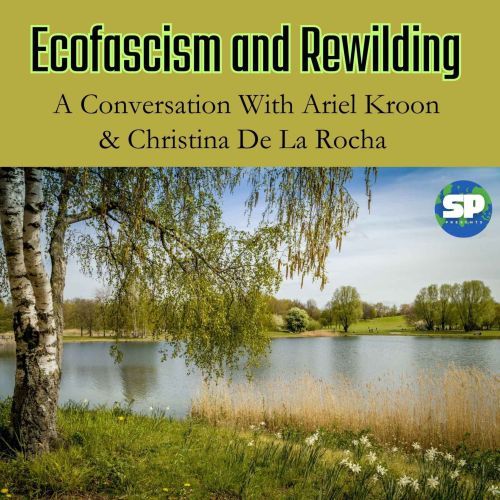
View On WordPress
#climate activism#ecocriticism#ecofascism#environmentalism#ethics#food forests#lifestyle#local food#locavore#nature conservation#rewilding#solarpunk#solarpunk presents podcast#sustainability#the Half-Earth project#The Sneetches#urbanism
23 notes
·
View notes
Text
"We could imagine, for example, restraint as a choice, as in the restraint needed not to extract 80 percent of the fossil fuel that remains underground, in order to maintain the conditions of possibility for ongoing human life. (Obviously a veneration of restraint means and applies differently depending on the circumstances: for example, the poor cannot and should not be expected to ‘restrain’ themselves for making living in the sole ways available to them.) As the state of addiction makes clear, repetitive, compulsive sating of our immediate desires rarely leads to emancipation. And yet, before we mock those who find freedom in air-conditioning, solitary driving, disposable wrapping, plastic straws, hamburgers, or frequent air travel, we might note that many of us have similar feelings and attachments: the goal is to event new norms that feel palatable - desirable, even - to people, not to shame them for their cathexis to comforts and ways of living in which we share" (184).
Maggie Nelson: On Freedom: Four Songs of Care and Restraint (2021)
#ecocriticism#ecology#natural history#environment#conservation#green products#theory#maggie nelson#philosophy#enviromentalism#climate solutions#climate action#climate change#ethics
105 notes
·
View notes
Text

least cucked military general
– Dana Phillips' essay "Excremental Ecocriticism and the Global Sanitation Crisis", as published in the compilation Material Ecocritism, on Thomas Pynchon's novel Gravity's Rainbow
#gravity's rainbow#thomas pynchon#postmodernism#satire#books and reading#ecocriticism#sanitation#environment#current global issues#anti military#meme#funny#mine
11 notes
·
View notes
Text
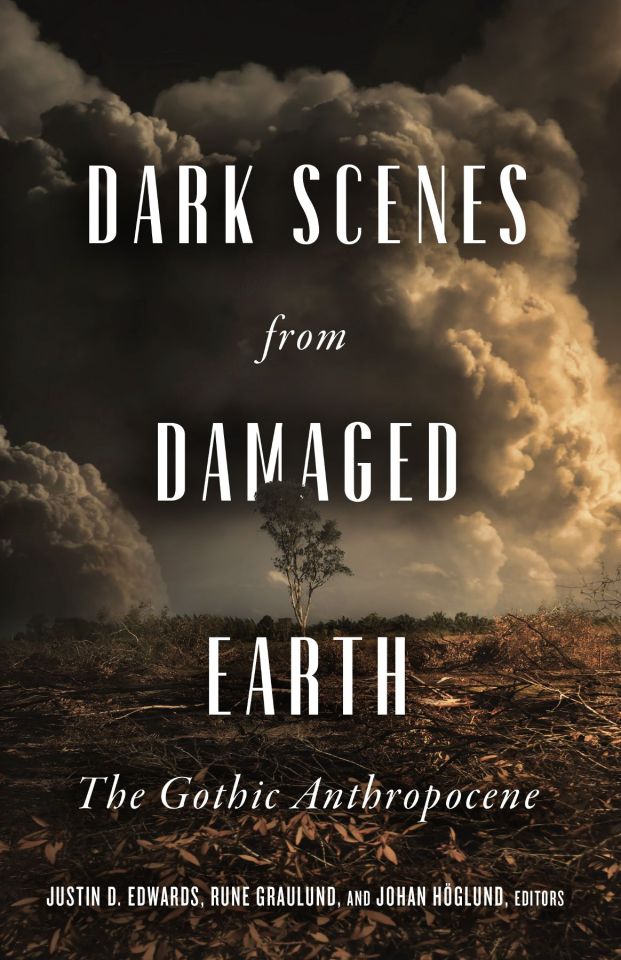
Maybe you will share in my excitement : I've been reading this since I discovered it yesterday! It explores the Capitalocene, the Plantationocene, and the Chthulucene, it talks about the Anthropocene as a geohistorical event as well as a literary object and how we use the gothic to talk about the gothic times we live in now.
The chapter on de-extinction written by Michael Fuchs is amazing, very exciting, can't wait to use this in my own work!!
This fantastic work on the ecogothic is in Open Access! Click here.
#i've been excited about this on my own since yesterday#i've talked about it to my supervisors and to my partner#but i don't think they're in on it yet#ecogothic#open access#the gothic anthropocene#dark scenes from damaged earth#ecocriticism
14 notes
·
View notes
Text
Hi there, I'm Ariel Kroon, and this is my Tumblr thing. I'm an independent scholar and a freelance academic editor, and so I'm going to be crossposting from my blog (when I blog). I'm hoping this won't take me down too many rabbit holes, but you never know.
I did my dissertation on post-apocalyptic Canadian science fiction published between 1948-1989, so expect me to post about obscure SF as well as my Opinions on apocalyptic discourse, the apocalyptic imaginary, cyberpunk and solarpunk. I use an intersectional feminist lens, as well as thinking with ecocriticism, affect theory, queer theory and gender studies, and I have a weakness for/history in feminist philosophical thought and also (xtian, protestant, crc, dutch-settler) religion.
I'm a third-generation Dutch immigrant, settler scholar on the trad. territory of the Haudenosaunee, Anishinaabe and Neutral peoples and it feels weird to disclose this because I'm also a millennial who grew up with LJ and non-anonymity online makes me feel really squeamish and vulnerable, but that's a privilege a lot of people don't get these days. Expect me to wrestle a lot with the discourse/idea of reconciliation in so-called Canada, cause I'm complicit as hell but I'm trying to do my best to be a conscientious race-traitor.
I also struggle with chronic fatigue, chronic pain, brain fog, short term memory issues, executive functioning, and I am on the road to figuring out what I suspect is the fact that I'm on the spectrum, so sometimes I don't really have the spoons or grace for being the best ally I can be. The discourse of the perfect activist is one I want to push back against, as someone with multiple disabilities; the excuse of being "too disabled" to ignore the suffering of others is, I think, a harmful myth that many of us - intentionally or not - tend to buy in to and I want to also push against that.
Disability studies isn't something I'm very familiar with at all, since my disabilities manifested after a car crash in 2019 (which exacerbated all the underlying issues I was busy masking / repressing while being in grad school, because I suddenly lost the ability to keep up my coping mechanisms). I look forward to learning more about pretty much all of these things, by the way.
Speaking of being very new to a field, I'm co-host of Solarpunk Presents Podcast (@solarpunkpresentspodcast); come along and learn with me and Christina De La Rocha about people doing their best in the present with an eye towards a better future world for all.
#ariel kroon#independent scholar#academia#scholarship#academic editor#freelance#blogger#ecocriticism#solarpunk#cyberpunk#science fiction#apocalypse#apocalyptic imaginary#intersectional feminism#affect theory#queer theory#gender studies#feminist philosophy#religion#millennial#settler scholar#Canada#LJ#livejournal#online anonymity#spoonie#spoonielife#actually disabled#disability studies#solarpunk presents podcast
4 notes
·
View notes
Text
"Ecology leads us to recognize that life speaks, communing through encoded streams of information that have direction and purpose, if we learn to translate the messages with fidelity." - William Howarth, "Some Principles of Ecocriticism"
#ecology#ecocriticism#greentheory#greenstudies#next time someone says trees can't talk to each other i show them this
3 notes
·
View notes
Text
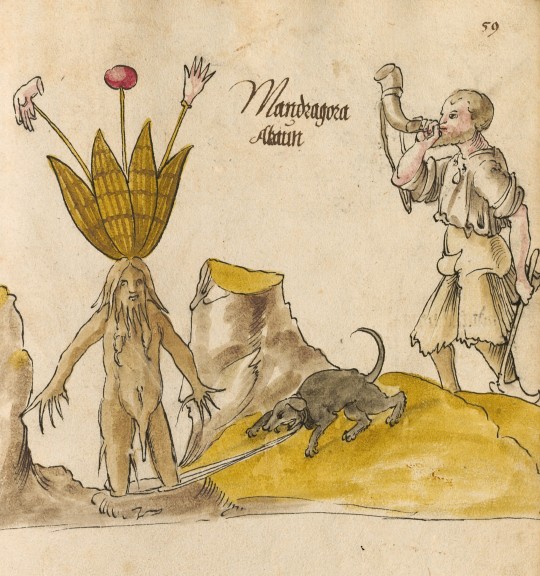
uprooting of a mandrake
illustration in a book of medicinal plants, bavaria, c. 1520-30
source: Munich, BSB, Cod.icon. 26, fol. 59r
#16th century#herbals#mandrakes#mandragora#dogs#plants#hybrids#musical instruments#ecocriticism#medieval art
129 notes
·
View notes
Text
I am planning on doing some more posts critically analyzing and discussing ecofascism, since a lot of people seem interested and it's something I want to better understand myself.
I want to start out talking about fascist desire and microfascisms, however, as a baseline for understanding what fascism is. For such a well-known subject, there is no definitive, universal consensus in political science regarding how we can define fascism at all, and in my opinion that is because the psychological and libidinal aspects of fascism are critical to understanding it. It would be wrong to say fascism can be described as a personality disorder, as Adorno claimed (measure how fascist you are on this very scientific "F-scale" test here; I got an average of 17% fascist). Even so, many fascist themselves explicitly reject reason and affirm concepts like will, struggle, or instinct as fundamental elements of fascist "consciousness". This sanctification of irrationality not only suggests an explanation of why fascism is so inconsistent across groups, but also begs the question of why and how such irrationalism comes to be in the first place.
After that, I want to investigate the early roots of ecofascism, especially in France and Germany in the late 19th century. My goal is to go from the earliest reactionary fetishizations of nature and authentic ties with the "soil" of the father land, and progress up to the present day ecofascist movements influenced by the climate crisis and concepts like deep ecology. I would like to answer the following questions, among others:
- Why has ecofascism become more popular in recent years?
- How is the ecofascist understanding of ecology and human-environment relations different from other ecological movements?
- What have been the most significant reactions to ecofascism in ecological and political discourses, and has the movement significantly changed these discourses in any way?
To put my cards on the table, I know more about the psychoanalytical aspects of studying fascism and less about ecofascist movements. I will be figuring out a lot of what I write about as I write it, and I'd invite anyone who disagrees to comment and let me know what you think. I studied English in college, and though I had some classes in political science and critical theory-related subjects on the side, this is mostly just a topic I'm interested in and read up on for fun. This also won't be a comprehensive survey of ecofascist history and texts; I don't have time to read every giant tractatus out there at the moment, so I'll be doing my best with the theory and history I already have under my belt and the literature I have time to read. I will also try to keep these posts relatively short for what they are (maybe like 1,000 words each if I can) because I do not have a lot of free time these days, and I don't want to bore you guys to sleep.
If you're also interested in this increasingly common and very unlikely fringe movement, I hope you'll get something out of it too.
More to come soon, thanks for reading :)
23 notes
·
View notes
Text
youtube
I disappeared off of the Internet, only to resurface with a forty-minute video of myself blabbering about language & literature. Typical.
#climate crisis#climate denial#climate change#climate justice#climate politics#climate action#climate disaster#ecocriticism#environmental studies#intersectional environmentalism#language and culture#english literature#south asian#desi dark academia#dark academia#video essay#social commentary#Youtube
4 notes
·
View notes
Text
Why Ecocriticism Needs the Social Sciences (and Vice Versa)
Tools Used in Connection with the Soil by May Rivers, from the Fruit Grower’s Guide (vintage illustration digitally enhanced by rawpixel, and modified here by the authors), CC BY-SA 4.0
By Matthew Schneider-Mayerson, Alexa Weik von Mossner, W.P. Malecki, and Frank Hakemulder:
Knowing that you need to tell a new story does not always mean that you know what to say, or how to say it. This is the…
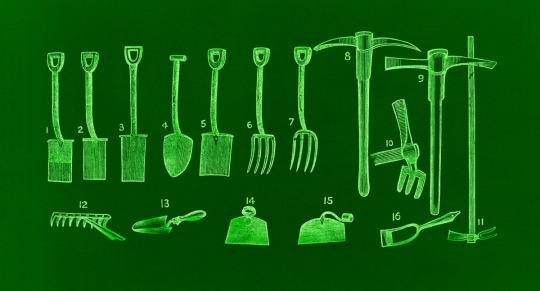
View On WordPress
#academia#climate fiction#ecocriticism#environmental communication#interdisciplinarity#social influence of environmental stories#social sciences
1 note
·
View note
Text

---------------
"It is in this radical sense that humans are no longer submitted to the diktats of objective nature, since what comes to them is also an intensively subjective form of action. To be a subject is not to act autonomously in front of an objective background, but to share agency with other subjects that have also lost their autonomy. It is because we are now confronted with those subjects—or rather quasi-subjects—that we have to shift away from dreams of mastery as well as from the threat of being fully naturalized. Kant without bifurcation between object and subject; Hegel without Absolute Spirit; Marx without dialectics. But it is also in another radical sense that the Earth is no longer “objective”; it cannot be put at a distance and emptied of all Its humans. Human action is visible everywhere—in the construction of knowledge as well as in the production of the phenomena those sciences are called to register."
-----------------------
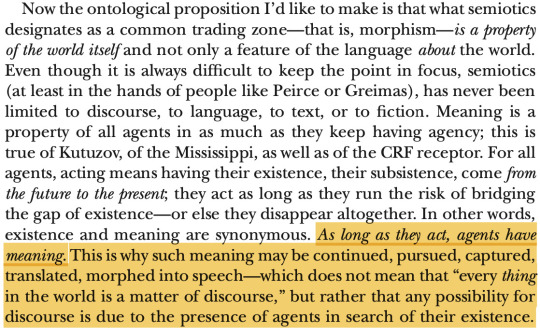
------------------
Chthulucene is a simple word. It is a compound of two Greek roots (khthôn and kainos) that together name a kind of timplace for learning to stay with the trouble of living and dying in response-ability on a damaged earth. Kainos means now, a time of beginnings, a time for ongoing, for freshness. Nothing in kainos must mean conventional pasts, presents, or futures. There is nothing in times of of beginnings that insists on wiping out what has come before, or, indeed, wiping out what comes after. Kainos can be full of inheritances, of remembering, and full of comings, of nurturing what might still be. I hear kainos in the sense of thick, ongoing presence, with hyphae infusing all sorts of temporalities and matieralities.
Chthonic ones are beings of the earth, both ancient and up-to-the-minute. I imagine chthonic ones as replete with tentacles, feelers, digits, cords, whiptails, spider legs, and very unruly hair. Chthonic ones romp in multicritter humus but have no truck with sky-gazing Homo. Chthonic ones are monsters in the best sense; they demonstrate and perform the material meaningfulness of earth processes and critters. They also demonstrate and perform consequences.
---------------------
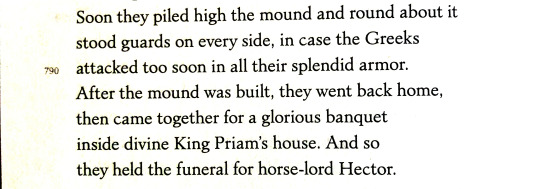
emily wilson's "introduction" to the iliad / bruno latour "agency in the time of the anthropocene" / donna j haraway staying with the trouble: making kin in the chthulucene / the iliad, 24.788-94, translated by wilson
10 notes
·
View notes